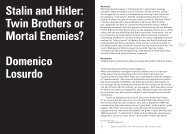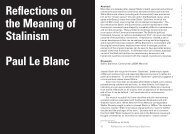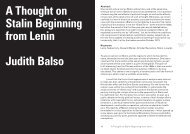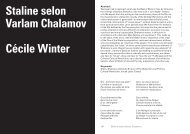adrian
adrian
adrian
- No tags were found...
You also want an ePaper? Increase the reach of your titles
YUMPU automatically turns print PDFs into web optimized ePapers that Google loves.
transition between Self-Consciousness and Reason, Hegel intends toconvey the claim that the Christianity of the Unhappy Consciousnesshistorically and (phenomeno)logically paves the way and serves as apossibility condition for the modern secular sciences of nature bornearly in the seventeenth century—and this despite the fact that therational scientific Weltanschauung that takes shape thanks to thecontemporaries Bacon, Galileo, and René Descartes promptly comesto generate a tension between itself and the religion of its historicalbackground. This is definitely an instance of, as the Phenomenology’sintroduction puts it, a transition between figures of phenomenalconsciousness (as Self-Consciousness and Reason, in this case)transpiring “behind the back of consciousness.” 80 Simply stated,science fails to recognize or remember its indebtedness to the religionout of which it emerges and with which it quickly enters into lastingconflict after this its emergence. 81 Moreover, Hegel indicates thatReason, first and foremost as Observing Reason, is especially proneto ahistorical amnesia (the proof of this being that working scientistsneed not and often do not pay much attention to the history of theirdisciplines). 82To be more precise, Hegel has in mind in the context presentlyunder consideration the role that God fulfills in Descartes’sphilosophy as expressed in the latter’s 1640/1641 Meditations onFirst Philosophy. Therein, the singular Supreme Being is reduced toserving as not much more than an ultimate guarantor of the veracityof both perceptually-based empirical (aposteriori) knowledge as wellas conceptually-based non-empirical (apriori) knowledge. As with,approximately three centuries later, Albert Einstein’s God who doesnot play games with dice, Descartes’s divinity is not an unreliabledeceiver, trickster, or the like. In addition to Bacon’s contributionof an epistemologically formalized/generalized methodology andGalileo’s of the identification of mathematics as the language ofnature, Descartes, at least tacitly, contributes to the foundations ofmodern science its supporting assumption that being is a rule-bound,stable field of existence knowable by thinking, with the signifier “God”CRISIS&CRITIQUE#3naming this presupposition. 83 Without such an assumption, scientificinvestigators never could launch into their inquiries in the first placewith the requisite inaugural confidence and conviction that, at least inprinciple, reality is law-like and, hence, comprehensible in the form ofposited laws with predictive power. This non-empirical article of faithprovides an indispensable philosophical/metaphysical ground for theempirical disciplines themselves, including modernity’s experimental,mathematized sciences of nature. The God of the UnhappyConsciousness (i.e., what Hegel designates in this sub-section of thePhenomenology “the Unchangeable,” 84 thus already foreshadowingthis depiction of Descartes’s) in which Self-Consciousness culminatescontinues to live on in and through the apparently secular (or evenatheistic) rationality sublating (as both preserving and negating) Him. 85Likewise, the “Holy Spirit” of the universal fellowship of believers unitedby faith and recognition in God morphs into the community of scientists,a community whose presence is entailed already in Baconian scientificmethod itself and whose powers of recognition are responsible fordetermining what does and does not count as genuine, true knowledge.Additionally, an earlier moment of Self-Consciousness also persistsinto and contributes to the new scientific rationality: The technologicalapparatuses, devices, implements, instruments, tools, etc. as well asthe technical skills to employ them, as jointly constituting a savoir-fairecrucial to Bacon’s Novum Organum Scientiarum essentially involvingexperimentation (and, hence, crucial to scientific savoir tout court), 86are inherited by Reason from the history of labor beginning with theslavery famously figuring in the sub-section of Self-Consciousnesson “Lordship and Bondage” (with serfs, artisans, craftsmen, and soon conserving and enriching this historically accumulated know-howextending across anonymous generations of unsung laborers). 87The opening paragraph of the section on Reason in thePhenomenology portrays this new shape of consciousness/Spiritas taking over and translating into its own terms (as per the positive,preservative side of the Aufhebung) a number of elements initiallyCRISIS&CRITIQUE#383 Pinkard 1996, p. 81.84 Hegel 1977c, pp. 131-132, 134-138.80 Hegel 1977c, p. 56.85 Johnston 2012, pp. 114-115; Johnston 2014c.81 Hegel 1977c, pp. 137-139.86 Bacon 2000, pp. 18, 33.82 Hegel 1977c, pp. 141-142.87 Hegel 1977c, pp. 115-116, 117-118.392 “Where to Start?: Robert Pippin, Slavoj Žižek...393“Where to Start?: Robert Pippin, Slavoj Žižek...






